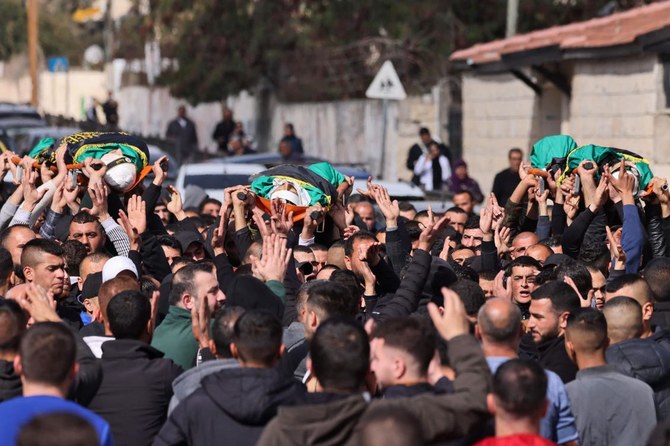The United States is concerned that escalating tensions in the West Bank could distract Israel and the United States’ attention from Iranian activities, a US official said, a message Defense Secretary Lloyd Austin intends to deliver in Israel on Thursday.
Austin delayed his arrival to Israel and the government insisted that the meetings’ location be changed because more protests were anticipated against a plan by Prime Minister Benjamin Netanyahu’s hard-right government to overhaul the country’s court system.
That comes as three Palestinians were killed on Thursday, days after Israeli forces raided a refugee camp in Jenin in the occupied West Bank on Tuesday, killing at least six Palestinian gunmen. Among the dead were a Hamas member suspected of shooting to death two brothers from a Jewish settlement near the village of Hawara.
“Secretary Austin is perfectly capable of having conversations about both issues (West Bank and Iran),” said a senior US defense official, speaking on the condition of anonymity because of the sensitivity of the issue.
But Israel’s preoccupation with the West Bank “detracts from our ability to focus on what the strategic threat is right now and that is Iran’s dangerous nuclear advances and continuing regional and global aggression,” the official said.
Austin is expected to meet Israeli Defense Minister Yoav Gallant and Netanyahu near the Tel Aviv airport.
The shooting of the two Israeli brothers triggered a revenge attack by Jewish settlers, who killed a Palestinian man and torched dozens of houses and cars in a rampage described as a “pogrom” by a senior Israeli commander.
The rampage triggered worldwide outrage and condemnation, which was increased when ultra-nationalist Finance Minister Bezalel Smotrich, who has responsibility for aspects of the West Bank administration, said Hawara should be “erased.” Smotrich later offered a partial retraction.
Netanyahu sought on Sunday to soften international outcry, saying Smotrich’s remarks had been “inappropriate.”
“Verbal assurances to do more to reduce the violence are empty without action to do so. The US can play a positive role in assisting only if there is there is a willingness to work for peace from all sides,” said Mick Mulroy, a former US deputy assistant secretary of defense for the Middle East.
There has been no sign of any letup in the violence ahead of the start of the Muslim holy month of Ramadan and the Jewish Passover festival.
Since the beginning of the year, Israeli forces have killed more than 70 Palestinians, including militant fighters and civilians; in the same period, Palestinians have killed 13 Israelis and one Ukrainian woman in apparently uncoordinated attacks.
RIGHT TO PROTEST
Last week, Israeli police fired stun grenades and scuffles broke out in Tel Aviv during a nationwide “day of disruption,” raising the intensity of protests against the government’s judiciary plan.
In images not seen in Tel Aviv for years, police on horseback confronted demonstrators breaching barricades as traffic piled up. Live footage showed police dragging protesters off the road to shouts of “Shame” and “We are the majority and we are out on the streets.”
The judicial overhaul would give Netanyahu’s nationalist-religious coalition decisive sway in picking judges and limit the scope of the Supreme Court to strike down legislation or rule against the executive.
In 2019, Netanyahu was indicted on corruption charges, which he denies.
He formed a government two months ago, promising his coalition partners would reshape the judiciary and entrench Israel’s control of the West Bank, where Palestinians hope to establish an independent state.
“Austin is committed to Israel’s security, but one of the dominant ways in which we’ve been able to work together and strengthen that relationship is because we’re two democracies that share values,” the US official said, adding that those values included the right to protest.
Dozens of Israeli air force reservists said on Sunday they would not turn up for training in protest against Netanyahu’s judicial reforms, a jolt for a country whose melting-pot military is meant to be apolitical.
Thirty-seven reserve F-15 pilots and navigators from the 69th Squadron circulated a letter on Sunday saying they would ditch some training flights to “devote our time to dialogue and reflection for the sake of democracy and national unity.”
Israeli air force reservists are required to fly as often as once a week to maintain operational readiness. They sometimes carry out combat missions. They are designated as volunteers, with no legal obligation to attend training.

